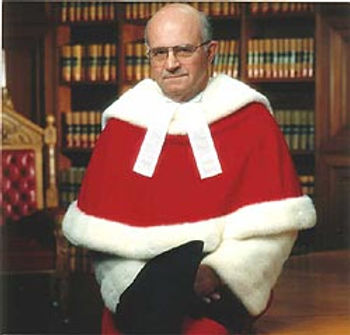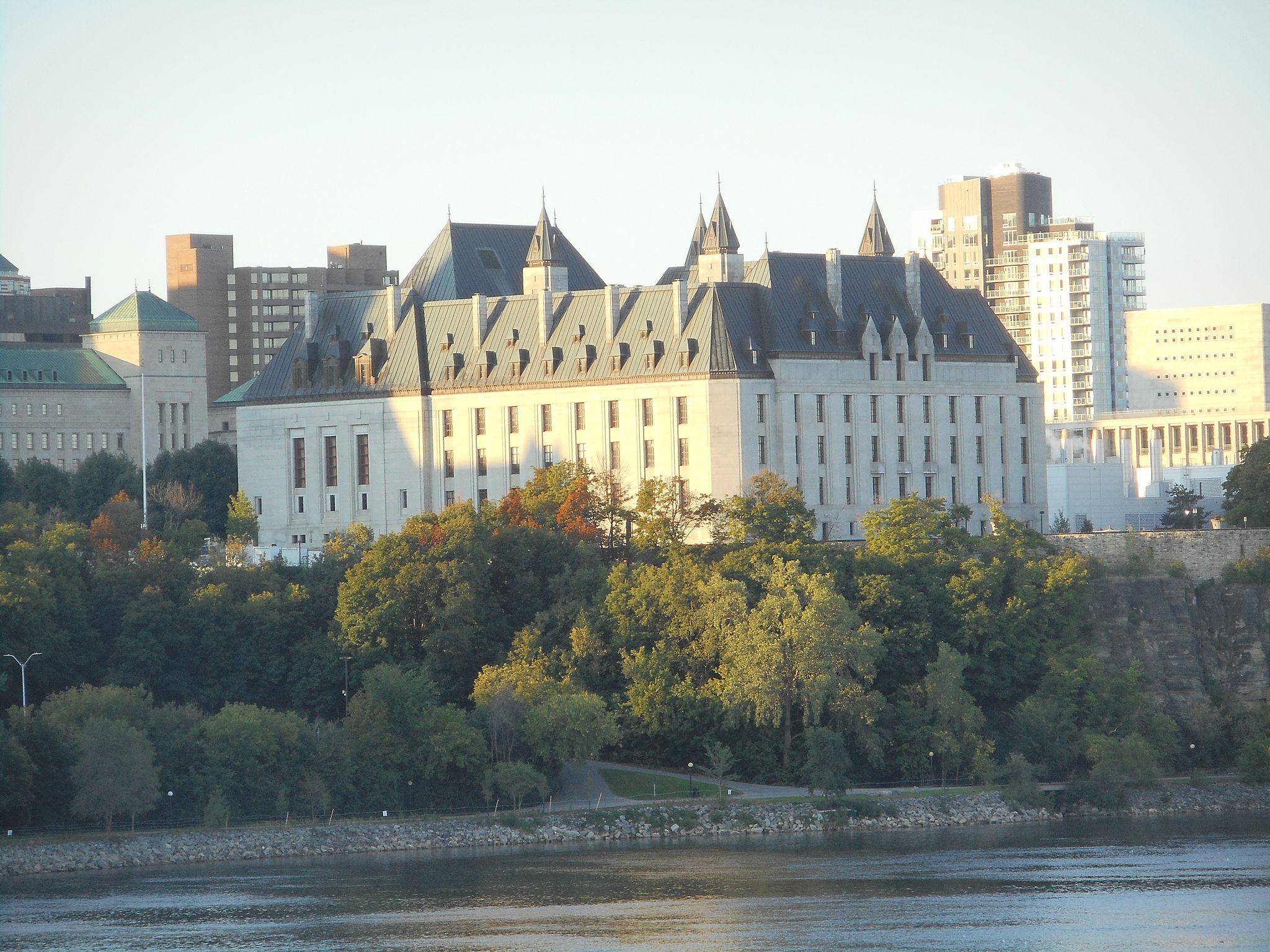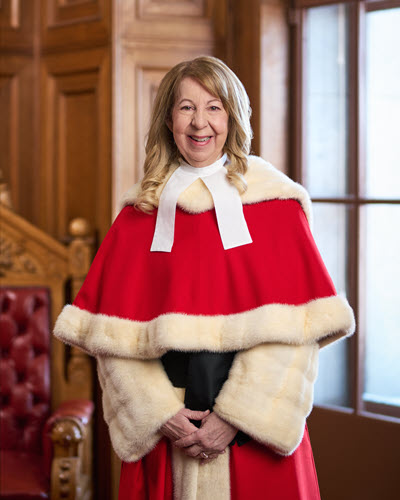Frank Iacobucci, CC, lawyer, educator, public servant, Federal Court of Canada chief justice, Supreme Court of Canada justice, board director, commissioner (born 29 June 1937, in Vancouver, BC). Frank Iacobucci practiced law in New York and Toronto before becoming a professor and dean at the University of Toronto’s Law School. He also served as Canada’s deputy minister of justice and deputy attorney general. He was then appointed chief justice of the Federal Court of Canada. In 1991, he became the first Italian Canadian appointed to the Supreme Court of Canada. Iacobucci retired from the bench in 2004. He continues to practice law in Toronto and serve on boards and commissions. He is a Companion of the Order of Canada and has received more than a dozen honorary degrees.

Early Life and Education
Frank Iacobucci’s parents immigrated to Canada from Italy. His father, Gabriel, arrived in 1922. His mother, Rosina (nee Pirillo), came three years later. Iacobucci was born in Vancouver. He grew up the third of four children in a working-class, mainly Italian neighbourhood in East Vancouver.
When he was 12, Iacobucci told the principal of Hastings Elementary School that he wanted to become a lawyer. He graduated from Britannia Secondary School and then studied at the University of British Columbia. He earned a Bachelor of Commerce in 1961 and a Bachelor of Law in 1962.
Iacobucci then earned a Newton W. Rowell Fellowship in International Law and a Mackenzie King Travelling Scholarship. He attended St. John’s College, Cambridge. He graduated in 1964 with master’s degree (LLM) and a diploma in International Law.
Personal Life
While in England, Frank Iacobucci met Nancy Eastham. She had graduated from Harvard University and was earning a diploma in International Law at Cambridge. They were married in October 1964. They had three children together: Andrew, Edward and Catharine.
Early Career
Frank Iacobucci began his law career in New York City with the large Wall Street firm Dewey, Ballantine, Bushby, Palmer & Wood. He handled a wide range of cases. They included corporate and commercial law, acquisitions and corporate finance.
Academic Career
In 1967, Frank Iacobucci became an associate professor and then professor of law at the University of Toronto. He wrote and taught many courses but specialized in business organizations, addressing the complex structure of business and corporate law. Among his many publications was a book on business organizations that served as a textbook for universities across Canada.
Iacobucci was appointed associate dean, and later dean of the University of Toronto Law School. He created courses that reached across disciplines, including the business planning cluster. It ensured that students interacted in small classes to interpret case studies.
In his 18 years at the University of Toronto, Iacobucci served in many administrative roles. These included vice-president of internal affairs and vice president provost.
Public Servant
From 1985 to 1988, Frank Iacobucci was Canada’s deputy minister of justice and deputy attorney general. In this role, he was responsible for overseeing the justice department’s large staff, handling numerous files, and making recommendations to the minister. Among the significant issues that Iacobucci oversaw were the Meech Lake Accord, the decriminalization of abortion, changes to the Official Languages Act and the creation of the Canadian American Free Trade Agreement. (See also Canada and NAFTA.)
Federal and Supreme Court Justice
In September 1988, Prime Minister Brian Mulroney appointed Frank Iacobucci chief justice of the Federal Court of Canada. The Federal Court hears appeals from lower courts regarding federals laws.
In January 1991, Iacobucci became the first Italian Canadian appointed to the Supreme Court of Canada. He served until 2004. Many of his decisions were significant. They included rulings that transformed our concepts of taxation and corporate law.
Return to Private Life
Following his retirement from the Supreme Court, Frank Iacobucci became senior council at Torys, a prestigious Toronto law firm. (See also John Tory.) Iacobucci served as chair of the board of Torstar (see Toronto Star). He also sat on the boards of Tim Hortons and the Canada Pension Plan Investment Board. He also lectured at the University of Toronto.
Iacobucci was appointed to many commissions and inquiries. These included the treatment of alleged terrorists in Canada’s court system and First Nations representation on juries.
In 2005, Iacobucci was appointed by the federal government to lead negotiations with residential school survivors, churches, the Assembly of First Nations and other Indigenous organizations. The discussions led to the awarding of the more than $2 billion Residential Schools Settlement Agreement. It was Canada’s largest class action law settlement. It led to the creation of the Truth and Reconciliation Commission.
In 2013, the Government of Ontario appointed Iacobucci as lead negotiator with the Chiefs of Matawa Tribal Council to settle disputes regarding northern mining development.
Honours and Awards
- Man of the Year Award, Canadian-Italian Business and Professional Association of Toronto (1985)
- Law Society Medal – Ontario (1987)
- National Congress of Italian Canadians – Toronto (1989)
- 125th Anniversary of the Confederation of Canada Medal (1992)
- Lion d'Or Award, Ordre des Fils d'Italia au Canada, Montréal (1995)
- Man of the Year Award, Brotherhood Interfaith Society, Vancouver (1999)
- Honorary Fellow, St. John's College, Cambridge University (1999)
- Honorary Fellow, American College of Trial Lawyers (1999)
- Premio Italia nel Mondo/Italy in the World Award (2001)
- Honorary Citizenship, Township of Grimaldi, Italy (2003)
- Companion, Order of Canada (2007)
- Justice Medal for Lifetime Achievement, Canadian Institute for the Administration of Justice (2009)
- Inductee, Toronto’s Italian Walk of Fame (2010)
- Queen Elizabeth II Diamond Jubilee Award (2012)
Honorary Degrees
- Doctor of Laws, University of Toronto (1989)
- Doctor of Laws, University of British Columbia (1989)
- Doctor of the University, University of Ottawa (1995)
- Doctor of Laws, University of Victoria (1996)
- Doctor of Laws, Law Society of Upper Canada (2000)
- Doctor of Laws, McGill University (2003)
- Doctor of Laws, University of Waterloo (2003)
- Doctor of Laws, Queen's University (2005)
- Doctor of Laws, York University (2005)
- Doctor of Laws, McMaster University (2008)
- Doctor of Civil Law, Western University (2009)
- Doctor of Laws, Lakehead University (2014)
- Doctor of Humane Letters, Victoria University at the University of Toronto (2015)
- Honorary Degree, Cape Breton University (2016)
- Doctor of Laws, Ryerson University (2017)
- Doctor of Laws, Ontario Tech University (2018)

 Share on Facebook
Share on Facebook Share on X
Share on X Share by Email
Share by Email Share on Google Classroom
Share on Google Classroom











